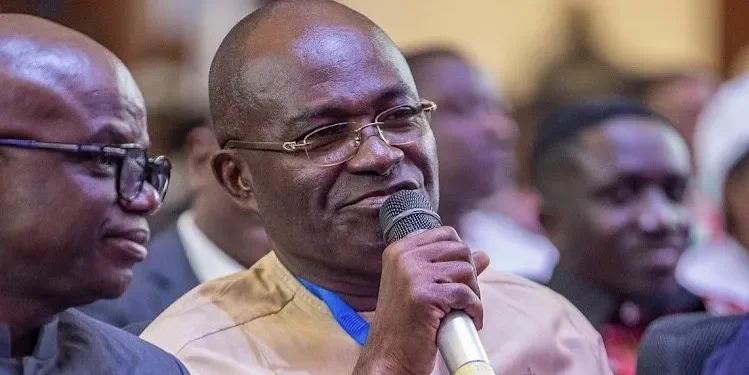Ghana, often called the gateway to West Africa, boasts a cultural tapestry that is diverse and rich.
With over 70 ethnic groups, each with its languages, traditions, and customs, Ghana is a microcosm of African heritage.
Despite its historical significance as a trade center and the birthplace of Pan-Africanism, Ghana’s culture remains relatively underrepresented on the global stage.
Executive Director of the National Commission on Culture (NCC), Mr. Wakefield Ackuaku, has called on Ghanaians and cultural agencies to take a more proactive role in promoting the nation’s rich heritage to international audiences.
Mr. Ackuaku emphasized the need to export Ghana’s culture, rather than waiting for tourists to visit the country to experience it.
“Ghana’s culture is vibrant and deeply rooted in unique traditions and values that can capture global attention. We should not wait for others to come to us — we should carry our culture to them.”
Mr. Wakefield Ackuaku
He urged stakeholders to explore platforms such as international festivals to enhance global awareness.
His remarks align with the broader goals of the Black Star Experience — an initiative launched on May 1, 2025, by President John Dramani Mahama, which aims to position Ghana as the cultural and creative capital of Africa.
Mr. Ackuaku described the Black Star Experience as a continuation of previous national initiatives like the Year of Return and Beyond the Return, aimed at reinforcing Ghana’s cultural identity and global appeal.
“As a commission, the NCC is committed to preserving and promoting Ghana’s culture and building a strong national identity. The Black Star Festival is one of the flagship projects under this broader effort.”
Mr. Wakefield Ackuaku

The experience includes a year-round lineup of festivals, exhibitions, performances, fashion showcases, culinary events, film screenings, and heritage projects.
At the heart of Ghana’s cultural identity lies its diversity. The Akan, Mole-Dagbani, Ewe, and Ga-Dangme are just a few of the ethnic groups that contribute to the country’s rich cultural landscape.
Each group brings unique traditions, music, dance, and art forms that reflect their history and values. For instance, the vibrant Kente cloth, woven by the Akan people, is not only a symbol of cultural pride but also a testament to the artistry and craftsmanship that have been passed down through generations.
By promoting these cultural elements globally, Ghana fosters a greater appreciation for its heritage and encourages cultural tourism, which is a vital economic driver.
Ghana’s history is intricately linked to the transatlantic slave trade, making it a critical site for understanding the African diaspora. The Cape Coast and Elmina Castles, UNESCO World Heritage sites, serve as poignant reminders of this dark chapter in history.
By highlighting these historical landmarks and the narratives surrounding them, Ghana educates the world about the resilience of its people and the importance of acknowledging the past.
This awareness is crucial for fostering dialogue about race, identity, and reconciliation on a global scale.
Artistic Expressions, Global Influence on Ghana’s Culture

Ghanaian music and dance are vibrant expressions of the country’s cultural identity, with genres like Highlife and Hiplife gaining international recognition.
Artists such as Osibisa and Sarkodie have successfully bridged cultural gaps, showcasing Ghanaian music to a global audience.
Moreover, the annual Chale Wote Street Art Festival in Accra brings together local and international artists, transforming the city into a canvas of creativity and collaboration.
By amplifying these artistic expressions, Ghana positions itself as a cultural hub, attracting artists, tourists, and investors alike.
Ghanaian cuisine, characterized by its rich flavors and communal dining practices, is another aspect of its culture that deserves global recognition.
Dishes such as Jollof rice, Banku, and Fufu not only tantalize the taste buds but also tell stories of community and tradition. As the world becomes increasingly interconnected, culinary tourism has emerged as a significant trend.
By promoting Ghanaian cuisine on the global stage, the country enhances its cultural profile while also supporting local farmers and food producers.
Ghana’s culture is a vibrant and dynamic tapestry that reflects the resilience, creativity, and diversity of its people.
By shining a global spotlight on its cultural heritage, historical significance, artistic expressions, and culinary traditions, Ghana fosters greater international understanding and appreciation.
This cultural exchange not only enriches the global community but also paves the way for economic growth through tourism and trade.
As the world becomes more interconnected, Ghana’s cultural narrative must be shared and celebrated, ensuring that its unique contributions to humanity are recognized and valued.
In doing so, Ghana takes its rightful place on the global stage, inspiring future generations and fostering a deeper understanding of the African experience.
READ ALSO: NPP Moves to Enforce Party Discipline





















